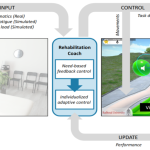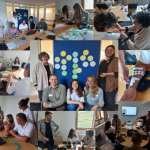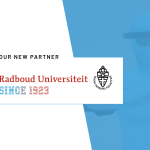 REHYB@TECNALIA: TECNALIA has developed a new EMG signal acquisition device - 10.07.2023. As part of the REHYB project, TECNALIA has developed a new EMG signal acquisition device that improves the performance of the previous device integrated into the beta prototypes developed in the REHYB project.
REHYB@TECNALIA: TECNALIA has developed a new EMG signal acquisition device - 10.07.2023. As part of the REHYB project, TECNALIA has developed a new EMG signal acquisition device that improves the performance of the previous device integrated into the beta prototypes developed in the REHYB project.  REHYB@SSSA: The certification process toward clinical trials - 23.06.2023. Many challenges have to be faced to develop a robotic rehabilitation device and a crucial point in the roadmap toward clinical testing of a new prototype is compliance with the EU Medical Device Regulation (MDR), which is always up to date to provide improvements toward conformity assessment of new prototypes and products.
REHYB@SSSA: The certification process toward clinical trials - 23.06.2023. Many challenges have to be faced to develop a robotic rehabilitation device and a crucial point in the roadmap toward clinical testing of a new prototype is compliance with the EU Medical Device Regulation (MDR), which is always up to date to provide improvements toward conformity assessment of new prototypes and products. REHYB@RU: Adaptive AI-based coaching for personalized interventions after stroke - 15.06.2023. Recent technological advancements have led to the development of various innovative solutions for neurorehabilitation, among which the combination of wearable exoskeletons and virtual reality-based exercises has emerged as a promising approach. However, a notable limitation in the field lies in the inadequate integration and coordination of different modules within virtual reality-robotic synergistic rehabilitative systems, primarily due to the absence of effective control architecture.
REHYB@RU: Adaptive AI-based coaching for personalized interventions after stroke - 15.06.2023. Recent technological advancements have led to the development of various innovative solutions for neurorehabilitation, among which the combination of wearable exoskeletons and virtual reality-based exercises has emerged as a promising approach. However, a notable limitation in the field lies in the inadequate integration and coordination of different modules within virtual reality-robotic synergistic rehabilitative systems, primarily due to the absence of effective control architecture. REHYB@SK: Workshop on electrode design with occupational and physical therapists - 09.06.2023. Practical operation of devices and equipment plays a crucial role in therapy in the clinical setting. SK welcomed TECNALIA, and TUM, and Valduce (online) for a 1-day hybrid-workshop on the design of the FES electrodes for final adjustments. TECNALIA presented the latest developments on the electrodes that were implemented since the last feedback and try-out sessions.
REHYB@SK: Workshop on electrode design with occupational and physical therapists - 09.06.2023. Practical operation of devices and equipment plays a crucial role in therapy in the clinical setting. SK welcomed TECNALIA, and TUM, and Valduce (online) for a 1-day hybrid-workshop on the design of the FES electrodes for final adjustments. TECNALIA presented the latest developments on the electrodes that were implemented since the last feedback and try-out sessions.  REHYB@TUM: Partner departure and new addition to the ReHyb project team - 02.06.2023. The ReHyb project would like to introduce the new project partner Radboud University (RU) joining the consortium. We are thrilled to announce that RU became officially the new partner of ReHyb project on 1st August 2022 and is represented by Donders Institute. RU team joined the project with their great experience in such a field and aim to revolutionize rehabilitation technology
REHYB@TUM: Partner departure and new addition to the ReHyb project team - 02.06.2023. The ReHyb project would like to introduce the new project partner Radboud University (RU) joining the consortium. We are thrilled to announce that RU became officially the new partner of ReHyb project on 1st August 2022 and is represented by Donders Institute. RU team joined the project with their great experience in such a field and aim to revolutionize rehabilitation technology REHYB@DTU: ReHyb project convened in Copenhagen for the 7th plenary meeting - 17.04.2023. REHYB consortium continued their progress in project implementation and concluded the 7th plenary meeting. On 13-14 April 2023, this event took place in Copenhagen at the Technical University of Denmark DTU with the presence of all project partners.
REHYB@DTU: ReHyb project convened in Copenhagen for the 7th plenary meeting - 17.04.2023. REHYB consortium continued their progress in project implementation and concluded the 7th plenary meeting. On 13-14 April 2023, this event took place in Copenhagen at the Technical University of Denmark DTU with the presence of all project partners.  REHYB@VALDUCE: Users evaluation on patient dashboard interface - 22.02.2023. VALDUCE and DTU have established a focused collaboration to conduct tests with stroke patients at VALDUCE in order to have a user evaluation regarding the patient version of the dashboard DTU is developing for Rehyb system. The goal of this activity was to deliver the best experience to stroke patients during the use of the dashboard to keep their motivation high and promote progression throughout their rehabilitation journey.
REHYB@VALDUCE: Users evaluation on patient dashboard interface - 22.02.2023. VALDUCE and DTU have established a focused collaboration to conduct tests with stroke patients at VALDUCE in order to have a user evaluation regarding the patient version of the dashboard DTU is developing for Rehyb system. The goal of this activity was to deliver the best experience to stroke patients during the use of the dashboard to keep their motivation high and promote progression throughout their rehabilitation journey. REHYB@DTU: The Human Digital Twin - 10.02.2023. DTU’s researchers continue proliferating their knowledge and expertise gained through the ReHyb project with other European research institutions. On the 31st of January, DTU was hosted by Elin Anna Topp and the Robotics and Semantic Systems research group in the Department of Computer Science, Lund University, for a research seminar.
REHYB@DTU: The Human Digital Twin - 10.02.2023. DTU’s researchers continue proliferating their knowledge and expertise gained through the ReHyb project with other European research institutions. On the 31st of January, DTU was hosted by Elin Anna Topp and the Robotics and Semantic Systems research group in the Department of Computer Science, Lund University, for a research seminar.  REHYB@ÖSSUR: Get the paperwork done - 10.10.2022. Many research projects in the medical device field result in a device prototype at some point in the project with the intention of testing with end users, but when is a prototype ready for such testing? The short answer is that it needs to be safe both for the user and others that are around the device during testing.
REHYB@ÖSSUR: Get the paperwork done - 10.10.2022. Many research projects in the medical device field result in a device prototype at some point in the project with the intention of testing with end users, but when is a prototype ready for such testing? The short answer is that it needs to be safe both for the user and others that are around the device during testing.  REHYB@STELAR: Privacy by Design and by Default – A brief overview - 08.08.2022 The concept of privacy by design requires that privacy should be taken into account during the entire lifetime of a project. From the early design stages to the operation of the system. This means that data protection measures are “baked in” the project and are not an “afterthought”.
REHYB@STELAR: Privacy by Design and by Default – A brief overview - 08.08.2022 The concept of privacy by design requires that privacy should be taken into account during the entire lifetime of a project. From the early design stages to the operation of the system. This means that data protection measures are “baked in” the project and are not an “afterthought”.